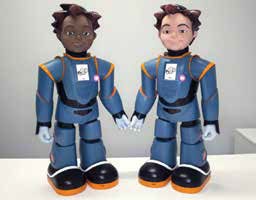The South Carolina Department of Education has launched a statewide, three-year pilot of RoboKind’s robots4autism program, combined with a social-emotional curriculum, for elementary-age students with autism spectrum disorder (ASD). Coordinated by the state Department of Education’s Special Education Department, at least two schools in fifteen school districts across the state began offering the pilot curriculum in the fall of 2017. The program currently serves more than 8,000 students in the Aiken, Anderson, Beaufort, Charleston, Colleton, Florence, Greenwood, Horry, Kershaw, Marion, Orangeburg, Pickens, Richland, Spartanburg, and Sumter school districts.

Milo and the robots4autism program is currently being marketed to school districts and therapy centers. After only a few months of use, one South Carolina school district reported a decrease in costs due to improvements shown by their students with ASD. Some students improved enough to avoid special residential care programs, and others were able to reenter regular education classes. Classroom instructional environments improved because the students participating in the robots4autism program had fewer behavioral problems, such as meltdowns or tantrums.
In addition to students with ASD, the robots4autism program can be used by students with other social or emotional diagnoses, as needed. Learning sessions with students are not recorded. However overall progression is recorded for development purposes through a dedicated web portal. The robots4autism program has a proven effectiveness of 70% for ASD learners on the spectrum.
RoboKind, LLC is the creator of humanoid social robots and accompanying curriculum that work together as cost-effective and inclusive education tools. The company currently offers two programs: robots4autism as discussed above, and robots4stem, in which students complete a fundamental coding curriculum and learn to program a humanoid robot. With each program RoboKind provides the applicable robot, curriculum training, support materials, and the appropriate curriculum with data analytics. The programs are currently being used in a total of 290 school districts in 27 U.S. states and three Canadian provinces. The company is working on several statewide initiatives similar to that in South Carolina, including but not limited to, Alaska, Georgia, Texas, and Wisconsin.